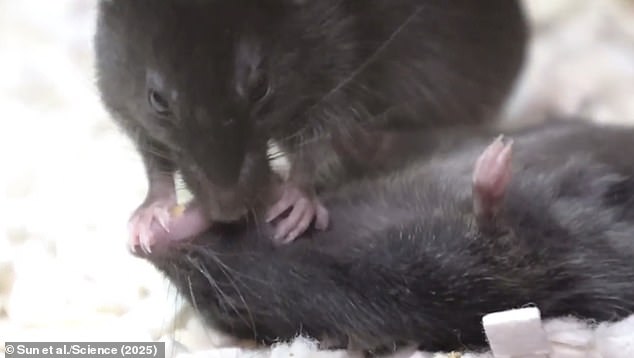Mice perform mouth-to-mouth resuscitation on fallen companions, a study has revealed.
The rodents were seen rushing to a drugged mouse and clearing the airways of the casualty.
The conscious animals would drag the tongue out of the immobilised mouse and bite around their mouth in what humans could consider mouth-to mouth.
The apparent attempt at resuscitation was also coupled with intense licking and grooming of the dormant rodent.
The attempts to revive the fallen were more intense if the mice knew each other, in what scientists considered was social recognition.
Researchers from the University of Southern California said the instinctive behaviour was ‘reminiscent of human emergency responses’.
Huizhong Whit Tao, who led the study which was published in the journal Science, added that the ‘clearance of foreign objects from the mouth, improved airway opening, and hastened recovery suggested reviving-like efforts.’
The mice would also release oxytocin hormones – needed for social bonding – when they saw the unconscious animal, The Times reports.

The rodents were seen rushing to a drugged mouse and clearing the airways of the casualty

Researchers from the University of Southern California said the instinctive behaviour was ‘reminiscent of human emergency responses’

The apparent attempt at resuscitation was also coupled with intense licking and grooming of the dormant rodent
‘Assisting unresponsive group members may be an innate behaviour widely present among social animals’, the study added.
Other animals like elephants, dolphins and chimpanzees are known to recognise an unconscious group member and will intervene by touching, nudging and sometimes carrying them.
It is not thought to be learnt behaviour but rather instinctual and this is the first time it has been reported in a study.
More than half of the cases showed that the mice would enlarge the airways of their unconscious counterparts.
The study also revealed that when an object was placed in an unconscious rodent’s mouth, it was removed 80 per cent of the time by the mouse performing ‘first aid’.
Rodents who did not receive the treatment did not recover as quickly as those who did.
In commentary, published in Science on the study, William Sheeran and Zoe Donaldson of the University of Colorado said that the findings showed that the impulse to help others in distress is ‘shared by many other species’.









